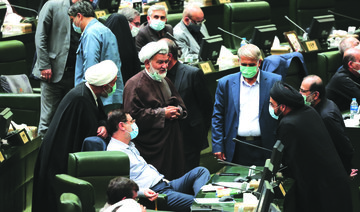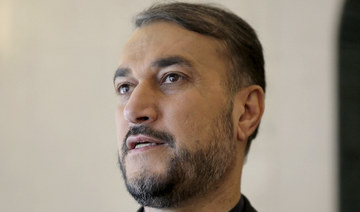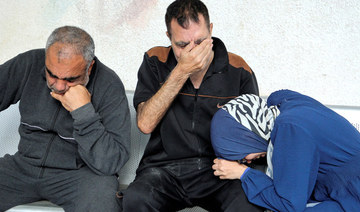TEHRAN: Iran’s hard-liner dominated Parliament on Wednesday voted to approve most of the ministers proposed by newly elected President Ibrahim Raisi, state TV reported.
Lawmakers voted in favor of 18 of 19 ministers proposed by Raisi after five days of hearings and discussions.
They did not approve Hossein Baghgoli, nominated for education minister, whose experience was disputed during hearings. He received 76 votes out of 286 present lawmakers. The chamber has 290 seats.
Raisi had appealed to lawmakers to vote quickly to approve his nominees so the government can get to work dealing with the pandemic and economic situation in the country suffering from years of sanctions by the US
Raisi has said his foreign policy will focus on engagement with all nations and the removal of sanctions. New Foreign Minister Hossein Amirabdollahian, who received 270 votes from lawmakers, said his ministry “would not run away from the negotiating table” and will do its best to remove all sanctions against the country.
Amirabollahian, 56, has served in a range of administrations over the decades. He was deputy foreign minister for Arab and African Affairs under former populist hard-line President Mahmoud Ahmadinejad, known in the West for his Holocaust denial and disputed re-election in 2009.
When relative moderate President Hassan Rouhani entered office in 2013, Amirabollahian kept his job before leaving to become an international affairs adviser to the former Parliament speaker. Rouhani struck the nuclear deal with world powers that granted Iran sanctions relief in exchange for curbs on its nuclear program.
In a hearing in Parliament on Sunday, Amirabdollahian said negotiations must guarantee the rights of the Iranian people. The diplomat also welcomed friendship with neighboring countries, especially with Iran’s regional rival Saudi Arabia “for the benefit of the whole region.”
Former foreign minister Mohammad Javad Zarif congratulated Amirabdollahian on his confirmation. “Wishing him, the ministry and its officials, and the new administration, all success in international relations,” Zarif said in a tweet.
Javad Owji, 54, a career technocrat and long-time official in the country’s vital oil and gas sector, received 198 votes to work as oil minister. Exporting crude is a major foreign source of revenue for the nation.
During the Parliament hearing, Owji promised to apply an “active attitude for bypassing sanctions” and use of the private sector in “exporting crude.”
The Cabinet list included no women, few surprises and several officials from Iran’s paramilitary Revolutionary Guard. The supreme leader also typically weighs in on picking officials for the most sensitive positions, such as foreign minister.
The parties to the nuclear accord have met in Vienna for months to try to revive the deal. The last round of talks ended in June with no date set for their resumption. Raisi has promised his administration will focus on lifting sanctions that have clobbered Iran’s already ailing economy.
Meanwhile, Gen. Ahmad Vahidi was confirmed Wednesday as the interior minister with 266 votes.
Vahidi is a former defense minister blacklisted by the US in 2010 and wanted by Interpol over his alleged role in the 1994 bombing of a Jewish cultural center in Buenos Aires. The attack killed 85 people and wounded hundreds.
Vahidi also served as commander of Iran’s expeditionary Quds Force in the late 1980s, responsible for Tehran’s proxies across the Middle East.
Later in the day, Raisi expressed gratitude to parliamentarians for their votes.
Iran Parliament approves most of president Ibrahim Raisi’s new ministers
https://arab.news/44jah
Iran Parliament approves most of president Ibrahim Raisi’s new ministers
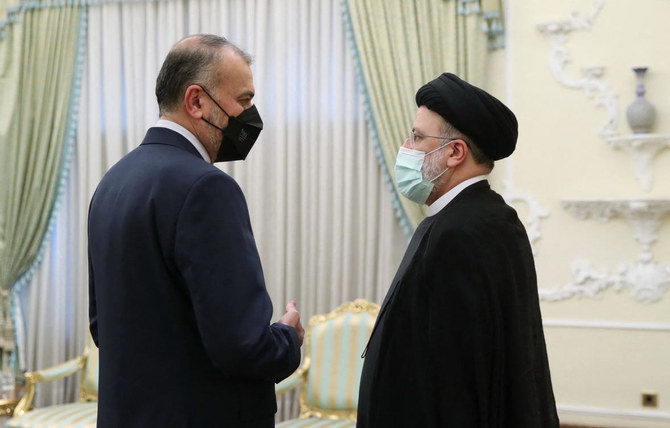
- Raisi had appealed to lawmakers to vote quickly to approve his nominees so the government can get to work
UN experts condemn Israel’s ‘sexual assault and violence’ in Gaza

“We are appalled that women are being targeted by Israel with such vicious, indiscriminate and disproportionate attacks, seemingly sparing no means to destroy their lives and deny them their fundamental human rights,” the seven special rapporteurs said in a statement.
Special rapporteurs are independent experts appointed by the UN Human Rights Council. They do not speak on behalf of the United Nations.
The statement pointed to “continued reports of sexual assault and violence against women and girls, including against those detained by Israeli occupation forces.”
They cited UN reports saying women and girls in Gaza were victims of enforced disappearances.
Referring to Hamas, which runs the besieged Palestinian territory, Israel’s mission in Geneva alleged the experts had “once again chosen to ignore Hamas’s systematic militarization of health facilities and civilian infrastructures in the Gaza Strip, voluntarily and actively using the population as human shields.”
“In issuing such a statement, the signatories try to create an alternative narrative, parroting the agenda of a terrorist organization that is actively destroying the lives of the Palestinian population in Gaza,” the Israeli mission said.
The bloodiest-ever Gaza war started after an unprecedented attack on southern Israel by militants from Hamas on October 7.
The attack resulted in the deaths of 1,170 people, mostly civilians, according to an AFP tally of Israeli official figures.
Israel’s relentless retaliatory military offensive has killed more than 34,700 people in Gaza — most of them women and children — according to Gaza’s health ministry.
The UN experts said Israel’s widespread destruction of housing in Gaza and the fact that Palestinians were having to live in “precarious” conditions in makeshift tents had a disproportionate impact on women and girls, particularly on their personal security and privacy.
“The treatment of pregnant and lactating women continues to be appalling, with the direct bombardment of hospitals and deliberate denial of access to health care facilities by Israeli snipers,” they added.
More than 180 women per day were giving birth without pain relief, while hundreds of babies have died due to a lack of electricity for incubators, they said.
These conditions have led to a surge in miscarriages, the experts said.
They said Israeli forces had “destroyed Gaza’s largest fertility clinic,” which stored embryos, and estimated that 690,000 women and girls in Gaza were deprived of menstrual hygiene products.
The Israeli mission in Geneva said Israel “categorically rejects unsubstantiated allegations of sexual assaults and violence.”
It said Israel was ready to investigate “any concrete claims of misconduct by its security forces when presented with credible allegations and evidence.”
The UN experts said “the government of Israel has continuously failed to conduct an independent, impartial and effective investigation into the reported crimes.”
‘Where can we go?’ say Rafah residents as Israel demands evacuation

- Areas designated for evacuation currently shelter some 250,000 people
- Israel’s retaliatory offensive, aimed at destroying Hamas, has killed at least 34,683 people in Gaza, mostly women and children
Rafah: Palestinian civilians in the southern Gazan city of Rafah voiced despair on Monday as Israel dropped fliers urging them to evacuate for their own “safety” ahead of a “limited” military operation.
Israel’s army said it was instructing Palestinian families in eastern Rafah to flee in preparation for an expected ground assault on the city which abuts Gaza’s border with Egypt.
Residents of Rafah described emerging outside after a terrifying night in which around a dozen air strikes were carried out on Rafah, to find fliers falling from the sky telling them to “evacuate immediately.”
“The army is working with intensive power against the terrorist forces near you,” read a flier circulated in eastern Rafah.
“For your safety, the IDF (Israeli military) tells you to evacuate immediately toward the expanded humanitarian zone of Al-Mawasi,” it said, with a map indicating the location to the north of Rafah.
Osama Al-Kahlout, of the Palestinian Red Crescent Society in Gaza, told AFP that the areas designated for evacuation currently shelter some 250,000 people, many of whom have already been displaced from other areas in the Gaza Strip.
“The evacuation process has begun on the ground, but in a limited manner,” he said.
An Israeli militark spokesman, when asked how many people should move, said: “The estimate is around 100,000 people.”
About 1.2 million people are currently sheltering in Rafah, according to the World Health Organization, most having fled there during the seven-month war between Israel and Hamas Palestinian militants.
Amid pouring rain, some of those sheltering in Rafah said they had begun packing up their things from the densely packed tents and preparing to leave even before Israel’s directive arrived.
“Whatever happens, my tent is ready,” a resident told AFP.
But others said the area they were being told to flee to was already overcrowded, and they did not trust that it would be safe.
Abdul Rahman Abu Jazar, 36, said he and 12 family members were in the designated evacuation area.
Jazar and his family did not know what to do, he said, because the “humanitarian zone” they were told to head for “does not have enough room for us to make tents because they are (already) full of displaced people.”
“Where can we go? We do not know,” he told AFP.
“There are also no hospitals and it is far from any services many need,” he said, adding that one of his family members relied on dialysis at the Al-Najar hospital, in the area of Rafah instructed to evacuate.
“How will we deal with her after that? Should we watch her die without being able to do anything?“
An Israeli military spokesman told reporters that the evacuation “is part of our plans to dismantle Hamas ... we had a violent reminder of their presence and their operational abilities in Rafah yesterday.”
On Sunday, four Israeli soldiers were killed and others wounded, the army said, when a barrage of rockets was fired toward the Kerem Shalom border crossing between Israel and Gaza.
The army said the rockets were fired from an area adjacent to Rafah.
International aid organizations have voiced alarm at the expected invasion of Rafah.
“From the humanitarian perspective, no credible humanitarian plan for an attack on Rafah exists,” said Bushra Khalidi, advocacy director for Oxfam in the Palestinian territories.
She said she could “not fathom that Rafah will happen,” asking where displaced Palestinians will go “when most of their surroundings have been reduced to death and rubble?“
Gaza’s bloodiest-ever war broke out following Hamas’s unprecedented October 7 attack on Israel which resulted in the deaths of more than 1,170 people, mostly civilians, according to an AFP tally of Israeli official figures.
Militants also seized some 250 hostages, with Israel estimating that 128 of them remain in Gaza, including 35 whom the military says are dead.
Israel’s retaliatory offensive, aimed at destroying Hamas, has killed at least 34,683 people in Gaza, mostly women and children, according to the Hamas-run territory’s health ministry.
US weapon system identified in Israeli-Lebanon strike may breach international law

- Guardian investigation with Human Rights Watch identifies Boeing-made Joint Direction Attack Munition fragments at site where aid workers were killed
- US bans export of such systems to foreign militaries where ‘credible information’ of human rights breaches exists
LONDON: An Israeli airstrike in Lebanon that killed seven aid workers in March may have been conducted with a US-supplied weapon system, according to an investigation by The Guardian.
The incident claimed the lives of seven paramedics aged 18-25, all volunteers, at an ambulance center in Al-Habariyeh in southern Lebanon on March 27.
It came five days before an Israeli strike in Gaza killed seven aid workers working for World Central Kitchen.
Debris found at the scene in Al-Habariyeh was identified by The Guardian, an independent expert and Human Rights Watch as having belonged to a 500-pound Israeli MPR bomb and a Boeing-made Joint Direction Attack Munition, a system attached to explosives to turn them from “dumb bombs” into GPS-guided weapons.
HRW’s Lebanon researcher Ramzi Kaiss told The Guardian: “Israel’s assurances that it is using US weapons lawfully are not credible. As Israel’s conduct in Gaza and Lebanon continues to violate international law, the Biden administration should immediately suspend arms sales to Israel.”
The US government is legally unable to help or arm foreign militaries where “credible information” of human rights abuses exists, under the terms of the 1997 Leahy law.
A spokesperson for the US National Security Council told The Guardian: “The US is constantly working to ensure defense articles provided by the US are being used consistent with applicable domestic and international law. If findings show violations, we take action.”
But Josh Paul, a non-resident fellow with Democracy for the Arab World Now and a former State Department employee, said: “The State Department has approved several of these (weapons) transfers on a 48-hour turnaround. There is no policy concern on any munitions to Israel other than white phosphorus and cluster bombs.”
He added that JDAMs have been “key items” regularly requested by Israel since the start of the Gaza war.
Secretary of State Antony Blinken will deliver a report on Wednesday to Congress on Israel’s use of American weapons and whether they may have been involved in violations of this or other laws.
Maryland Sen. Chris Van Hollen told The Guardian that the findings from Al-Habariyeh are “deeply concerning and must be fully investigated by the Biden administration, and their findings should certainly be included in the NSM-20 report that is due to be submitted to the Congress on May 8.”
The airstrike on the ambulance center in Al-Habariyeh came without warning before 1 a.m. on March 27. No fighting had been reported in the area.
The victims had been at the center for the night shift, and were named as twin brothers Hussein and Ahmad Al-Shaar, aged 18; Abdulrahman Al-Shaar, 19; Mohammad Hamoud, 21; Mohammad Al-Farouk Aatwi, 23; Abdullah Aatwi, 24; and Baraa Abu Kaiss, 24.
The Israeli military claimed that the strike, which leveled the two-storey building, killed a “prominent terrorist belonging to Jamaa Islamiya,” an armed Lebanese political group with ties to Hezbollah. It did not identify the person by name.
A Jamaa Islamiya spokesman acknowledged that some of the ambulance volunteers were members of the group, but denied that they were part of its armed wing.
Samer Hardan, head of the local Civil Defense center who was among the first responders, told The Guardian: “We examined every centimetre looking for parts of bodies and their possessions. We saw nothing military-related. We knew (the victims) personally, so we could identify their remains.”
Since Oct. 7, 16 medical workers have been killed by Israeli airstrikes in Lebanon, and a further 380 people have died including 72 civilians. Eleven Israeli soldiers and eight civilians have also been killed.
Kassem Al-Shaar, father of Ahmad and Hussein, said he had warned his sons not to volunteer.
“I told them that it was dangerous to do this type of work, but they said that they accepted the risk. I don’t know what Israel was thinking — these were young people excited to help others,” he said.
“My sons wanted to do humanitarian work, and look what happened to them. Israel wouldn’t dare to do what they did if it wasn’t for the US standing behind them.”
Aid groups issue urgent appeal for Yemen funds
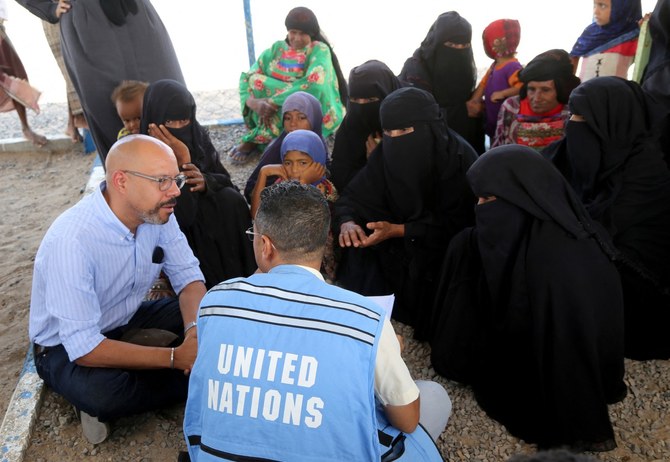
- UN agencies warned that 18.2 million people in need of help after nine years of war
Dubai: Nearly 200 aid groups appealed on Monday for funds to bridge a $2.3 billion shortfall in assistance for war-torn Yemen, warning of potentially “catastrophic consequences” for the Arabian Peninsula’s poorest country.
A joint statement from 188 humanitarian organizations, including several UN agencies, warned that 18.2 million people — more than half the population — were in need of help after nine years of war.
Their appeal came a day before a meeting of high-ranking EU officials in Brussels to discuss the aid program for Yemen, which is suffering one of the world’s worst humanitarian crises.
“Inaction would have catastrophic consequences for the lives of Yemeni women, children and men,” the statement said, calling Tuesday’s meeting a “critical moment.”
“The humanitarian community appeals to donors to urgently address existing funding gaps, and provide sustainable support to enhance resilience and reduce aid dependency.”
Yemen has been gripped by conflict since the Iran-backed Houthis overran the capital Sanaa in 2014, triggering the Saudi-led military intervention in support of the government the following year.
Hundreds of thousands have died in the fighting or from indirect causes such as a lack of food, the United Nations says.
Hostilities slowed considerably in April 2022, when a six-month, UN-brokered ceasefire came into effect, and they have remained at a low level since.
But only $435 million of the $2.7 billion called for in Yemen’s 2024 Humanitarian Response Plan requirement has been raised, the aid groups said, warning of threats including food insecurity, cholera and unexploded ordnance.
“Underfunding poses a challenge to the continuity of humanitarian programming, causing delays, reductions and suspensions of lifesaving assistance programs,” it said.
“These challenges directly affect the lives of millions who depend on humanitarian assistance and protection services for survival.”
UN atomic watchdog chief Rafael Grossi arrives in Iran: media
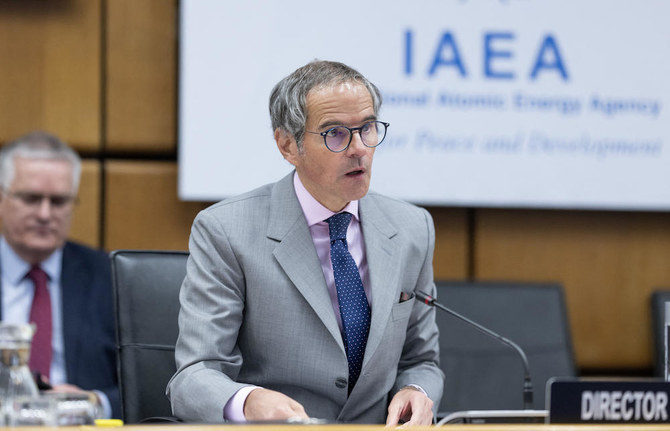
- Visit comes at a time of heightened regional tensions and with IAEA criticizing Iran for lack of cooperation on inspections and other outstanding issues
TEHRAN: UN atomic watchdog chief Rafael Grossi arrived Monday in Iran, where he is expected to speak at a conference and meet officials for talks on Tehran’s nuclear program.
“The Director General of the International Atomic Energy Agency arrived in Tehran on Monday at noon at the head of a delegation to participate in the nuclear conference and negotiate with top nuclear and political officials of the country,” Tasnim news agency said, with other agencies reporting the same details.
The visit comes at a time of heightened regional tensions and with the IAEA criticizing Iran for lack of cooperation on inspections and other outstanding issues.
Grossi, head of the IAEA, is expected to deliver a speech at Iran’s first International Conference on Nuclear Science and Technology.
The three-day event, which starts on Monday, is being held in Isfahan province, home to the Natanz uranium enrichment plant and where strikes attributed to Israel hit last month.
The IAEA and Iranian officials reported “no damage” to nuclear facilities after the reported attack on Isfahan, widely seen as Israel’s response to Iran’s first-ever direct attack on its arch foe days earlier, which itself was a retaliation for a deadly strike on Tehran’s Damascus consulate.
During his visit, Grossi is expected to meet with Iranian officials including the Islamic republic’s nuclear chief Mohammad Eslami.
On Wednesday Eslami, head of the Atomic Energy Organization of Iran, said he was “sure that these negotiations will further help clear ambiguities, and we will be able to strengthen our relations with the agency.”
Iran in recent years has deactivated IAEA monitoring devices at nuclear facilities and barred inspectors, according to the UN agency.
Grossi last visited Iran in March 2023 and met with top officials including President Ebrahim Raisi.
Iran has suspended its compliance with caps on nuclear activities set by a landmark 2015 deal with major powers after the United States in 2018 unilaterally withdrew from the agreement and reimposed sweeping sanctions.
Tensions between Iran and the IAEA have repeatedly flared since the deal fell apart, while EU-mediated efforts have so far failed both to bring Washington back on board and to get Tehran to again comply with the terms of the accord.
Last year, Iran slowed down the pace of its uranium enrichment, which was seen as a goodwill gesture while informal talks began with the United States.
But the Vienna-based UN nuclear agency said Iran accelerated the production of 60-percent enriched uranium in late 2023.
Enrichment levels of around 90 percent are required for military use.
Tehran has consistently denied any ambition to develop nuclear weapons, insisting that its atomic activities were entirely peaceful.
In February, the IAEA said in a confidential report seen by AFP that Iran’s estimated stockpile of enriched uranium had reached 27 times the limit set out in the 2015 accord.
On Sunday, the Iranian official news agency IRNA said Grossi’s visit provides “an opportunity for the two sides to share their concerns,” especially with regard to the IAEA’s inspectors.
Iran in September withdrew the accreditation of several inspectors, a move described at the time by the UN agency as “extreme and unjustified.”
Tehran, however, said its decision was a consequence of “political abuses” by the United States, France, Germany and Britain.
Eslami said the IAEA has “more than 130 inspectors” working in Iran, insisting Tehran remains committed to cooperating with the nuclear watchdog.



